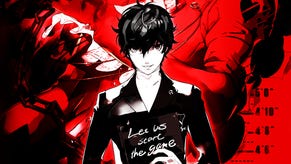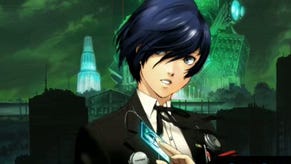Shin Megami Tensei: Persona 3 Portable
Ta-ta to Tartarus.
Shown to a steadily flagging and slightly nonplussed audience at E3, Sony's new PSP marketing campaign focused on the portable's library of "full-sized" games, as a sleepy-eyed office worker talked up his 40-hour progress in Metal Gear Solid: Peace Walker. If Sony wanted to make it all about the numbers, Persona 3 Portable might have been an even better shout; an already hefty runtime has been doubled with the addition of a female-fronted campaign, multiplying the replay value of a game that had plenty in the first place. The hour tally could easily reach three figures here.
Describing Persona 3 Portable as "half dating sim, half randomly-generated-dungeon-crawler" wouldn't be entirely inaccurate, nor would it come close to communicating the appeal of this terrific RPG. By day, you're sitting through lectures, chatting to schoolmates and flirting with girls; at night, you spend your time ascending the terrifying tower of Tartarus, offing demons called Shadows in turn-based battles. Again, that might sound about as appetising to the majority as an Uwe Boll double-bill, but Atlus has worked a minor miracle in not only making these seemingly disparate elements fun, but in skilfully placing them in an interdependent relationship that makes both sides feel equally important.
The game is essentially built around the Social Links you make with your schoolmates. Talk to someone during lunch and they'll usually ask if you want to meet up after school. Listen to their problems, offer sympathetic responses and your relationship with them may improve. Each key NPC - of which there are over 20 - is represented by a tarot card, which increases in power the stronger your ties to them.
These cards are key to your progress through Tartarus, as you fight alongside a group of fellow school chums who are all staying at the same dormitory. This isn't coincidence; you've been selected to join this cabal of demon-slayers thanks to your ability to summon internal Personas, powerful creatures who can do your bidding in battle, and whose skills are affected by the strength of your Social Links.
(It has to be said, it's still pretty unnerving to see just how these kids summon their inner demons, even if we no longer see the cut-scenes where characters anxiously finger the triggers of their 'Evokers', attempting to pluck up the courage to blast a pretend hole in their skull.)
The more links you make, the more Personas you can summon, and the more options you have should you decide to fuse two or more of these demons. A strong bond with someone will add a significant amount of experience to your newly-fused Persona, thereby allowing you to summon a demon several levels higher than your character.
There's a wealth of different Personas to choose from, each with a blend of elemental abilities and strong melee attacks. Thankfully, you don't need to worry about the rest of your party, as they're only able to summon one Persona each, and these will level up automatically as they fight alongside you.
The majority of the creatures you fight have one or more weaknesses to exploit; hit them with the right kind of attack and you get a bonus turn. It's possible to get through encounters without your opponent having had a chance to attack, particularly if you sneak up on a Shadow, as you'll be given a free go as battle commences. Similarly, if they spot you and hit you before you've drawn your sword, they'll get the chance to strike the first blow.
Knock all opponents down, or achieve a critical hit, and you get the chance to use an All-Out Attack. This allows all characters to race in and use multiple standard attacks in an attempt to finish the fight quickly and effectively, piling into a Tex Avery cartoon cloud replete with onomatopoeic text for all the smashes and thwacks.
In truth, Tartarus is more a training exercise for the full-moon events; a way of ensuring you're progressing at a steady rate so that you're sufficiently levelled for the large Shadows which emerge every month. While visits to the tower are entirely optional, Atlus subtly encourages you to explore by periodically warning you that a hapless human has wandered in and needs to be rescued, or through a character letting you know they're in the mood for a bit of monster-bashing.












